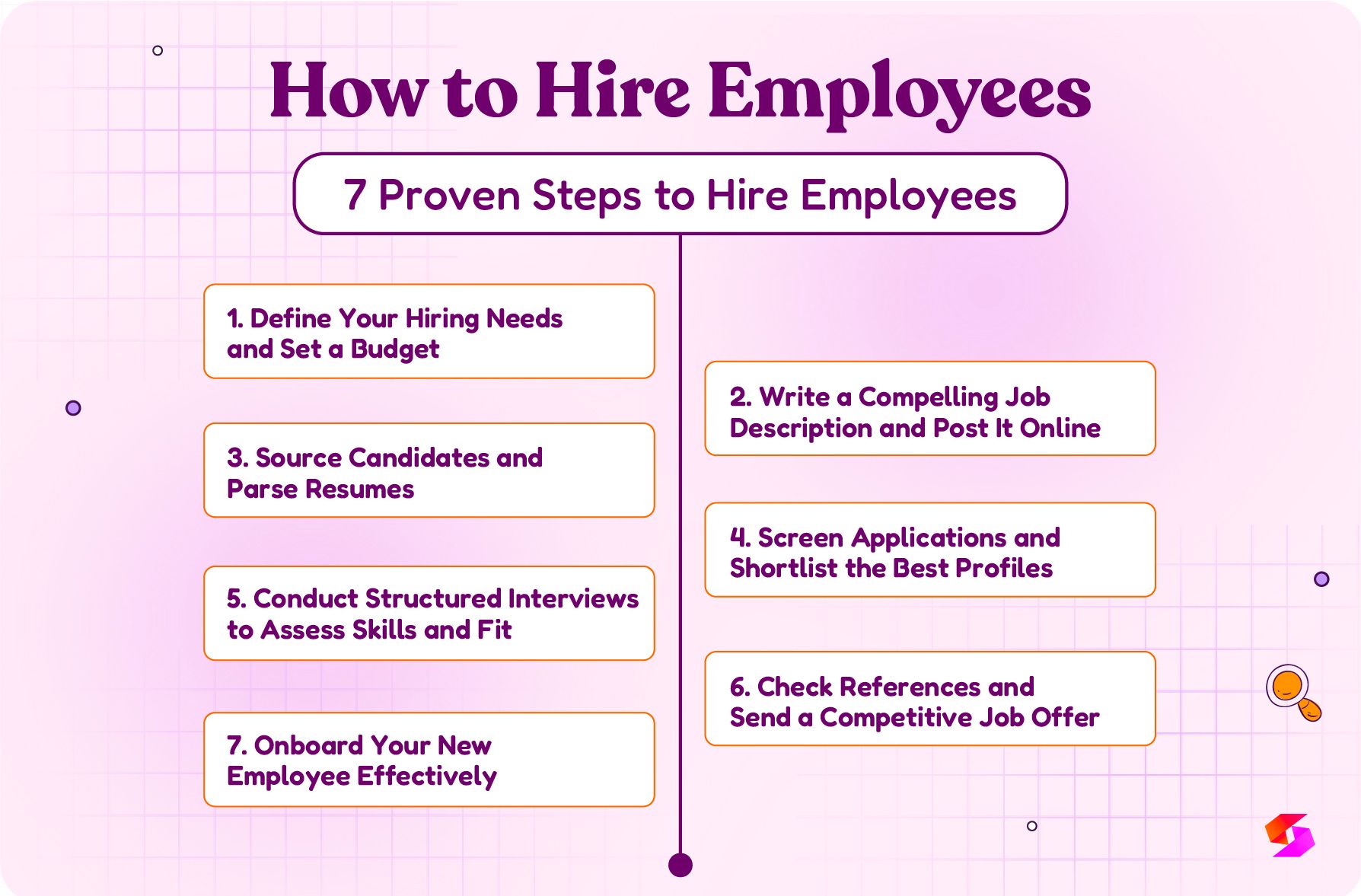Here is a structured 7‑step process to hire employees used by top hiring teams to attract, evaluate, and onboard quality talent effectively:
- Define the role’s purpose, responsibilities, and budget before sourcing.
- Write a compelling job description and post it widely.
- Proactively source candidates (LinkedIn, referrals) and use AI resume parsing.
- Screen applicants via Skima AI matching and shortlist the top candidates.
- Conduct structured interviews (same questions for all) to reduce bias.
- Verify references and make a competitive offer.
- Onboard your new hires effectively.
This proven approach boosts applicants by 42%, cuts screening time by 67%, and makes interviews twice as effective.
Hiring the wrong employee can cost your company up to 30% of that person’s annual salary. And yet, several hiring teams still rush the process, overlook red flags, or rely solely on gut feeling.
In a competitive market where top talent disappears in days, you can't afford to guess your way through hiring.
This is a research-backed hiring guide for modern recruiters at startups, agencies, and enterprises. Additionally, it provides real-world strategies, tools, and data to help you make every hire count. From writing magnetic job posts to seamless onboarding, learn how to hire employees smarter and faster.
7 Proven Steps to Hire an Employee
A structured hiring process helps you improve the quality of your hires and avoid expensive mistakes.
Below is a 7-step systematic roadmap on how to hire employees, trusted by top hiring teams to attract, evaluate, and onboard top talent.

1. Define Your Hiring Needs and Set a Budget
Before you post a job or reach out to candidates, get crystal clear on what you're hiring for. What business problem are you solving with this hire? Is it a net-new role or a replacement? Start by defining the responsibilities, expected outcomes, and reporting structure.
Next, set a realistic hiring budget. This should include:
- Salary range based on market data (e.g., Glassdoor, Levels.fyi)
- Benefits, bonuses, and perks
- Hiring costs: job boards, recruiting software, agency fees, etc.
Pro tip: The average cost-per-hire in the U.S. is around $4,700, but it can exceed that for technical or executive roles. Planning ahead helps avoid delays and overspending later.
2. Write a Compelling Job Description and Post It Online
Your job description is often your first impression, and it needs to do more than list responsibilities. A strong JD should sell the role and your company culture while clearly outlining expectations.
Here’s what a compelling JD includes:
- A clear, engaging job title.
- A concise summary of the role’s purpose.
- Responsibilities broken down into bullet points.
- Must-have and nice-to-have qualifications.
- Salary range and benefits (transparency boost applications).
Once your JD is polished, post it on high-visibility job boards like:
- Skima AI (one-click multi-board job posting platform)
- Indeed
- Glassdoor
- Your own careers page
Note: JDs with inclusive, gender-neutral language get up to 42% more qualified applicants.
3. Source Candidates and Parse Resumes
Don't just wait for applicants; proactively source them. The best candidates are often passive, not actively applying.
especially if you need to hire fintech developer.
Here’s how top recruiters find the right talent:
- Search internal resume databases in seconds with AI tools like Skima AI.
- Use LinkedIn Recruiter or AI search to identify qualified professionals. This is one of the best ways to hire employees.
- Tap into employee referrals; they’re 4 times more likely to be hired.
- Attend virtual or niche industry events for targeted networking.
Once you have a batch of resumes, use a resume parsing tool to extract and organize key information (skills, experience, education). This saves time and allows easy comparison.
Data: Recruiters spend just 7.4 seconds reviewing a resume on average. Accurate parsing ensures nothing important gets missed.
4. Screen Applications and Shortlist the Best Profiles
Once applications start coming in, it’s time to separate the top talent from the rest. Start by reviewing resumes against the must-have qualifications outlined in your job description. Focus on measurable achievements over generic responsibilities.
Prioritize candidates who show:
- Direct experience in similar roles or industries.
- Clear results (e.g., “Increased sales by 30% in 6 months”).
- Career progression and stability.
Use an AI resume matcher like Skima AI to rank profiles by relevance in seconds. It gives a score out of 100 to every profile with explanations.
Stat to note: Recruiters spend about 23 hours screening resumes and shortlisting candidates for a single hire. Use the most advanced AI models of Skima AI to avoid such huge mistakes.
5. Conduct Structured Interviews to Assess Skills and Fit
Now that you've identified your shortlist, reach out to shortlisted candidates. You can automate outreach with personalized Skima AI campaigns across email, SMS, LinkedIn, and calls. Let them know they have been selected, what to expect next, and how to schedule their interviews.
Now, it’s time to dig deeper with structured interviews. This means asking the same set of role-relevant questions to every candidate. This levels the playing field and cuts down on bias.
Use a combination of:
- Behavioral questions (e.g., “Tell me about a time you…”).
- Role-specific tasks or case studies.
- Soft skills assessments (especially for leadership or client-facing roles).
Research: As per Harvard Business Review, structured interviews are twice as effective at predicting on-the-job performance compared to unstructured ones.
6. Check References and Send a Competitive Job Offer
Before sending an offer, take 10–15 minutes to speak with 2–3 professional references. Focus your questions on:
- Work ethic and collaboration
- Strengths and development areas
- Reliability and ability to handle pressure
If everything looks good, prepare a competitive offer that aligns with market benchmarks. Include:
- Base salary + bonus (if applicable)
- Benefits, equity, and perks
- Start date and any contingencies (e.g., background checks)
Quick stat: 49% of candidates decline offers due to poor communication. Make your offer clear, fair, and prompt.
7. Onboard Your New Employee Effectively
Once your offer is accepted, the real work begins. You must help your new hire succeed from day one. A structured onboarding process ensures they feel welcomed, aligned, and ready to contribute quickly.
A structured onboarding experience sets the tone for engagement, performance, and retention.
Here’s how to onboard properly:
- Prepare equipment, access, and paperwork before day one.
- Assign a buddy or mentor for smoother integration.
- Introduce company culture, values, and team expectations.
- Set clear goals for the first 30, 60, and 90 days.
Fact: Companies with strong onboarding improve new hire retention by 82% and productivity by over 70%. A thoughtful start can prevent early exits and boost morale from day one.
Now that you know how to hire employees step by step, let’s look at the real costs of hiring an employee. We’ll also explore ways to cut those costs while keeping quality high.
Cost of Hiring an Employee & How to Reduce It
The total cost of hiring an employee often ranges between $4,000 and $20,000+, depending on the role, tools, and approach.
You can use an all-in-one hiring platform to reduce this significantly without sacrificing quality. Here is how Skima AI helps in cutting unnecessary hiring costs:
- Eliminates individual job board listings with one click, auto-distributes AI-optimized listings across high-visibility channels.
- Saves 30-40 hours per hire through automated resume screening and shortlisting.
- Replaces costly assessments with built-in skill tests tailored to each role.
- Reduces dependency on external recruiters or agencies by automating sourcing & outreach.
- Includes built-in ATS and analytics. Also, it cuts the costs of multiple software subscriptions.
- Its integrations allow you to connect your existing stack seamlessly.
Skima AI automates the most time-consuming (and expensive) parts of hiring. This helps you save thousands on each hire while still ensuring quality.
Legal Requirements for Hiring Employees
Hiring in the U.S. involves key federal and state-level legal criteria that every employer must follow. Below are the six essential requirements:
1. Get an Employer Identification Number (EIN)
All businesses with employees must obtain an EIN from the IRS. This unique 9-digit tax identification number is required for payroll and tax reporting. You can apply for it online for free through IRS.gov.
2. Verify Work Eligibility using Form I‑9
Every employer in the U.S. must fill out Form I-9 for each new hire. This form confirms the employee's identity and their legal authorization to work. If you also engage independent contractors, collect Form W-9s for 1099-NEC reporting; FormPros W-9 maker can help them generate accurate forms and minimize TIN/name mismatch issues.
Both employee and employer portions are mandatory, and Section 2 must be completed within three business days of the start date.
3. Report New Hires to the State
When you hire staff, federal law says you must report all new hires or rehires within 20 days. You need to send this information to the state’s “Directory of New Hires." This supports child support enforcement and unemployment systems.
4. Comply with Federal and State Labor Laws
Employers must adhere to:
- The Fair Labor Standards Act (FLSA) governs minimum wage, overtime, and recordkeeping.
- Equal Employment Opportunity (EEO) protections.
- OSHA rules for workplace safety apply especially if you have five or more employees in the private sector. A common best practice is asking new employees to undergo basic safety instruction like an OSHA 10 training program to reduce workplace risks.
5. Post Required Labor Law Notices
U.S. employers must display federal and state labor law posters in a visible workplace location. Posters include rights under wage, safety, and anti-discrimination laws. The Department of Labor provides these for free.
6. Obtain Workers’ Compensation Insurance
Most states, including California and Florida, require workers’ compensation coverage when you have employees. This insurance helps pay for medical expenses and lost wages from work-related injuries. It also protects you from liability lawsuits.
3 Best Hiring Software Top Hiring Teams Use
Top recruiters use intelligent hiring platforms to automate tasks, match candidates, and make smarter decisions. Below are three top-rated tools widely trusted by the best hiring teams in the U.S.
| S. No. | Hiring Software | Best For | Pricing | Free Trial |
| 1 | Skima AI | End-to-end AI hiring for small businesses to enterprises | $49/month per user | ✅ |
| 2 | Greenhouse | Mid to large enterprises | Undisclosed | ✅ |
| 3 | Lever | Collaborative recruiting | Undisclosed | ✅ |
1. Skima AI
Skima AI is an end-to-end AI hiring software built for recruiters who value data-driven, high-quality hiring at scale. Its in-house AI models help you streamline job posting, talent sourcing, resume parsing, candidate matching, personalized outreach, and analytics.
Plus, it is designed to integrate seamlessly with your existing ATS, payroll, VMS systems, and more. Skima AI enables teams to hire faster without sacrificing quality or increasing the learning curve.
Key Features of Skima AI:
- One-click multi-board job posting
- Accurate AI Resume Parsing
- Powerful AI Search (Trained on millions of resumes)
- AI Matching Score & Reasoning
- Custom AI Matching Models
- Local Database Search (talent rediscovery)
- Talent pipeline management
- Branded Careers Page
- Seamless Integrations to ATS, LinkedIn, Job Board, Chrome, etc.
- Enterprise Grade Security & Compliance (SOC 2)
- Advanced Analytics & Reporting
- Dedicated Infrastructure Options (Cloud, On-premises, Hybrid)
Skima AI's Impact: Teams using Skima AI report up to 40% faster hiring cycles and 2x higher-quality applicants, based on internal case studies.
2. Greenhouse
Greenhouse is a leading ATS and recruitment software. It centralises all hiring stages, from sourcing and structured interviews to onboarding and analytics.
The platform includes AI-powered tools, custom workflows, and numerous integrations. These features help companies streamline hiring and enhance decisions with data-driven insights.
Key Features of Greenhouse:
- AI-Powered Recruiting
- Talent Sourcing & CRM
- Structured Interview Management
- Diversity & Inclusion Tools
- Reporting & Analytics
- Onboarding & Candidate Experience
- Integrations
3. Lever
Lever combines an ATS with a CRM, helping hiring teams nurture passive talent just as effectively as active applicants. Its intuitive UI and automation features make it easy for recruiters and hiring managers to stay in sync.
Moreover, businesses can customize workflows to improve collaboration and decision-making. This leads to quality hires and cost savings over time.
Key Features of Lever:
- Applicant Tracking System centralizes all candidate data.
- AI Interview Intelligence provides structured interview guides.
- Recruitment analytics, such as time-to-hire, offer acceptance rates, etc.
- Recruitment tasks automation, like candidate outreach, scheduling, etc.
Top 5 Hiring Strategies Used by Top Recruiters
The best recruiters today build long-term talent pipelines, reduce turnover, and consistently deliver high-impact hires. Below are five research-backed hiring strategies used across leading organizations:
1. Implement Skills-Based Hiring with Validated Assessments
Rather than filtering candidates by degrees or job titles, top recruiters at companies like Meta and Google evaluate core competencies early using skills-based hiring:
- Build your job profiles around capabilities, e.g., coding, data analytics, and customer empathy.
- Use validated assessments (cognitive, simulation, personality) before interviewing.
In 2025, 85% of employers have adopted skills-based hiring, a rise from 81% the previous year.
Result: A broader, more diverse candidate pool, and hires who deliver value faster.
2. Assess & Rank Candidates with a Structured Scoring Model
Leading recruiters use a transparent scoring framework from the start of resume reviews:
- Score each applicant on key areas: skills, relevant experience, industry fit, and strong career signals.
- Batch-screen resumes, like 20–30 at a time, using the same criteria.
- Share the top-ranked profiles with hiring managers for agreement and validation.
Label profiles as "non-negotiable," “should have," and “nice-to-have” before shortlisting down the interview pool.
3. Activate Hiring Managers & Teams as Brand Ambassadors
In high-performing teams, recruiters make hiring managers part of the attraction strategy:
- Create LinkedIn content with the manager talking about the role and team culture.
- Include employee testimonials or “day in the life” stories to add a personal touch.
- These actions increase job awareness, boost engagement, and improve referral rates, often taking less than 30 minutes a week.
Also, when managers are empowered, decisions are made faster, and candidates align better.
4. Prioritize Candidate Experience Through Transparency & Speed
In today’s candidate-driven market, the overall experience matters:
- Be open about salary ranges and benefits. SHRM reports a 48% increase in application rates when compensation is transparent.
- Simplify applications by cutting steps and removing repeated data entry. Also, support mobile-friendly submissions. Over 89% of applicants prioritize mobile-optimized application experiences.
- Speed up the process for high-intent candidates. Conduct interviews within 24 to 48 hours. This can cut hiring times in half.
These moves show respect for candidates’ time and enhance your employer brand.
5. Use of Predictive Talent Analytics
Forward-thinking teams are no longer guessing who might perform; they use data to predict hiring outcomes.
They track and analyze:
- Which sources yield the best hires (by retention/performance)
- Interview-to-offer ratios by recruiter
- Time-to-productivity by hire type
- Offer acceptance trends
This helps to optimise your hiring funnel, reduce costs, and hire more accurately.
5 Mistakes to Avoid When Hiring Employees
Even proven hiring processes can fail due to common mistakes. Here are five key pitfalls that successful teams avoid when hiring new employees, based on research:
1. Don't Rush the Hiring Process
When teams hire too quickly, they often skip essential steps like multiple interviews, skills assessments, and reference checks.
Why it matters: A survey found 74% of small-business employers acknowledged hiring the wrong person at least once. 17% of these mistakes cost between $1000–$2,500, and another 20% cost $2,500–$5,000.
How to avoid it:
- Map out a realistic timeline (e.g., 4–6 weeks per hire).
- Use structured interview stages and assessments.
- In short-term gaps, consider part-time or freelance support instead of rushing for a full-time hire.
2. Job Descriptions That Confuse or Mislead
Vague job postings attract unqualified candidates and disappoint those who are a good match.
Why it matters: Organizations with well-defined job descriptions receive up to 42% more qualified applicants than those without.
How to avoid it:
- Involve hiring managers and future teammates when drafting job responsibilities and success criteria.
- Avoid corporate jargon and highlight measurable outcomes.
- Include the salary range, remote/office expectations, and company values to set clear expectations.
3. Overlooking Cultural Fit and Soft Skills
Skills-only evaluations miss critical predictors of long-term success, like adaptability, teamwork, and attitude.
Why it matters: 28% of mis-hires occur when candidates lack the right attitude or cultural alignment.
How to avoid it:
- Incorporate behavioral questions that reveal values and work styles.
- Include existing team members in interviews.
- Use personality or cognitive assessments when relevant, especially in service-focused roles.
4. Skipping Reference and Background Checks
Hiring without vetting past performance can lead to surprises and sometimes costly mistakes.
Why it matters: Around 28% of employers admit to skipping reference checks, missing critical red flags in candidates' histories.
How to avoid it:
- Speak to at least two former managers or peers, focusing on performance, reliability, and collaboration.
- Use background checking tools where appropriate (especially for finance, security, or compliance-heavy roles).
- You can also verify licenses, certifications, and employment claims at scale by using credentialing software, which helps confirm that candidates actually meet role-specific requirements before you hire them.
5. Allowing Bias from Halo Effect or Gut Instinct
At last, judging candidates by their background or first impressions can make you miss out on those with greater potential.
Why it matters: Business Insider reports that 90% of hiring decisions suffer from halo-effect bias. This happens when one strong quality influences the overall assessment.
How to avoid it:
- Use structured interviews and evaluation rubrics.
- Blind resumes where possible (remove names, schools, and dates).
- Review evaluation scores collectively to reduce individual bias.
When you stop these mistakes, your bad-hire rate reduces dramatically. Moreover, it boosts team spirit, reduces turnover costs over time, and speeds up productivity. This helps you create a stronger, more united workforce.
Summary - Start Hiring Smart Today
Hiring the right employee is one of the most high-stakes decisions a business makes, directly impacting team performance, culture, and long-term growth. Yet, many companies still struggle with unclear processes and rising costs.
This guide broke down how to hire employees the right way. You now have clear steps, expert strategies, and practical tools to streamline everything from job descriptions to onboarding.
With the right system, you reduce costs, improve the quality of hires, and scale faster. Skima AI gives you that edge with secure AI hiring automation. Start your 14-day free trial now.
Frequently Asked Questions
1. How to hire an employee?
To hire an employee, define the role clearly, create a compelling job post, source candidates, conduct structured interviews, and onboard efficiently. Use tools like Skima AI to streamline and optimize the entire process.
2. What is the most effective way to hire employees?
The most effective way is to use AI-powered hiring platforms like Skima AI. This saves time and boosts the quality of every hire.
3. How can I reduce the cost of hiring without compromising on quality?
To reduce the cost of hiring without compromising on quality, use tools like Skima AI. It makes hiring easier, removes manual tasks, and helps you find the best candidates faster. This can greatly lower your hiring costs.
4. What tools help with writing better job descriptions?
AI hiring platforms like Skima AI offer smart job description generators tailored to your role, industry, and location. They help ensure clarity, relevance, and better-quality applicants.
5. Why is my hiring process taking so long?
Manual tasks, poor screening, and misaligned systems slow you down. Skima AI automates screening and engages candidates. This helps you cut time-to-hire while keeping the right fit.
6. How to hire employees for small business?
Small businesses should focus on role clarity, lean hiring tools, and culture fit. Use cost-effective platforms like Skima AI to attract, assess, and onboard top talent without overstretching your resources or time.
7. What are the best hiring platforms for startups?
Startups need speed, precision, and scalability. Skima AI is built for modern teams with end-to-end recruitment automation. It requires no complex setup or unnecessary features.




